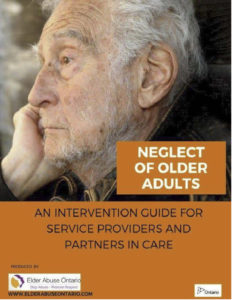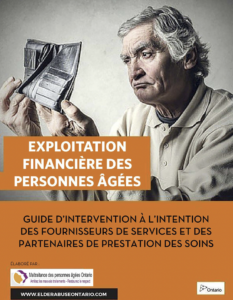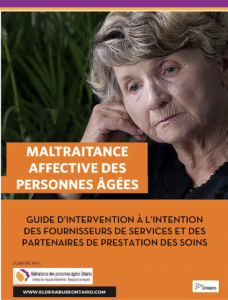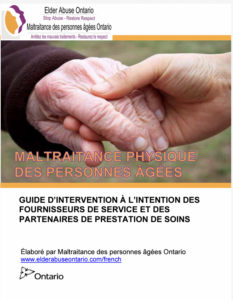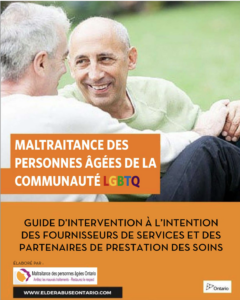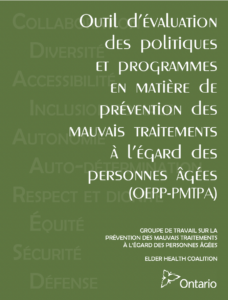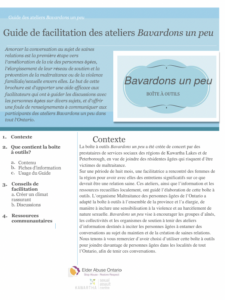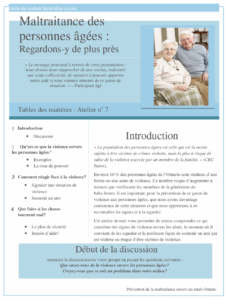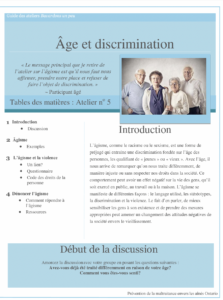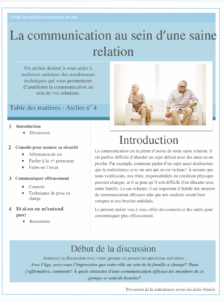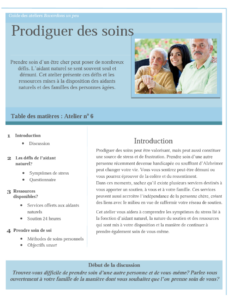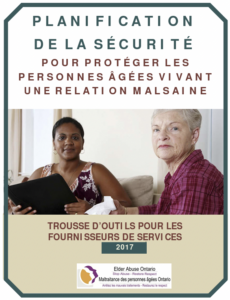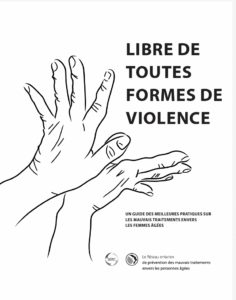Choisissez un sujet dans les catégories ci-dessous.
Deuil
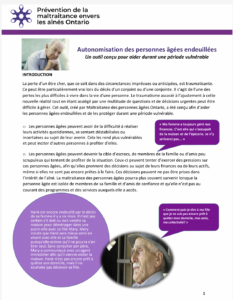
Le présent outil a été conçu pour aider les personnes âgées endeuillées à se protéger au moment où elles sont vulnérables. Les scénarios de cas financiers et émotifs décrits dans cette ressource comprennent des trucs utiles pouvant contribuer à prévenir la maltraitance et la négligence des aînés ainsi que des moyens à employer afin d’encourager leur autonomie, de défendre leurs intérêts et de promouvoir leurs droits.
Télécharger Français
Guide d’intervention destiné aux fournisseurs de service et aux partenaires de soins
Une série de guides de formation offerte en format standard expose les différentes formes que peuvent prendre l’abus des aînés et les faits à ce sujet. Chaque guide comprend des sections sur les thèmes suivants : Définitions, facteurs de risque et signaux d’alarme, stratégies d’entrevue, planification de la sécurité, signalement et lois, études de cas et ressources provinciales pour le soutien des aînés. Chacune de ces sections peut être utilisée séparément pour aborder des domaines spécifiques à étudier ou intégralement pour convenir à divers milieux de formation ou défis liés aux contraintes de temps. Des secteurs interdisciplinaires peuvent utiliser le guide et le mettre à profit en provoquant des discussions qui susciteront des débouchés.
Le Guide présente des études de cas sur la négligence, reflète des histoires vraies qui visent à évoquer des perceptions personnelles face aux situations qui se présentent, à encourager la pensée critique liée à une réaction ou à une intervention, et à promouvoir les meilleures pratiques, en fonction du rôle et du poste de la personne.
Télécharger : Français
Une série de guides de formation offerte en format standard expose les différentes formes que peuvent prendre l’abus des aînés et les faits à ce sujet. Chaque guide comprend des sections sur les thèmes suivants : Définitions, facteurs de risque et signaux d’alarme, stratégies d’entrevue, planification de la sécurité, signalement et lois, études de cas et ressources provinciales pour le soutien des aînés. Chacune de ces sections peut être utilisée séparément pour aborder des domaines spécifiques à étudier ou intégralement pour convenir à divers milieux de formation ou défis liés aux contraintes de temps. Des secteurs interdisciplinaires peuvent utiliser le guide et le mettre à profit en provoquant des discussions qui susciteront des débouchés.
Le Guide présente des études de cas sur l’abus financier, en reflétant des histoires vraies, qui visent à évoquer des perceptions personnelles face aux situations qui se présentent, à encourager la pensée critique liée à une réaction ou à une intervention, et à promouvoir les meilleures pratiques, en fonction du rôle et du poste de la personne.
Télécharger : Francais
Une série de guides de formation offerte en format standard expose les différentes formes que peuvent prendre l’abus des aînés et les faits à ce sujet. Chaque guide comprend des sections sur les thèmes suivants : Définitions, facteurs de risque et signaux d’alarme, stratégies d’entrevue, planification de la sécurité, signalement et lois, études de cas et ressources provinciales pour le soutien des aînés. Chacune de ces sections peut être utilisée séparément pour aborder des domaines spécifiques à étudier ou intégralement pour convenir à divers milieux de formation ou défis liés aux contraintes de temps. Des secteurs interdisciplinaires peuvent utiliser le guide et le mettre à profit en provoquant des discussions qui susciteront des débouchés.
Le Guide présente des études de cas sur l’abus émotif, en reflétant des histoires vraies, qui visent à évoquer des perceptions personnelles face aux situations qui se présentent, à encourager la pensée critique liée à une réaction ou à une intervention, et à promouvoir les meilleures pratiques, en fonction du rôle et du poste de la personne.
Télécharger : Francais
Une série de guides de formation offerte en format standard expose les différentes formes que peuvent prendre l’abus des aînés et les faits à ce sujet. Chaque guide comprend des sections sur les thèmes suivants : Définitions, facteurs de risque et signaux d’alarme, stratégies d’entrevue, planification de la sécurité, signalement et lois, études de cas et ressources provinciales pour le soutien des aînés. Chacune de ces sections peut être utilisée séparément pour aborder des domaines spécifiques à étudier ou intégralement pour convenir à divers milieux de formation ou défis liés aux contraintes de temps. Des secteurs interdisciplinaires peuvent utiliser le guide et le mettre à profit en provoquant des discussions qui susciteront des débouchés.
Le Guide présente des études de cas sur la violence physique, en reflétant des histoires vraies, qui visent à évoquerdes perceptions personnelles face aux situations qui se présentent, à encourager la pensée critique liée à une réaction ou à une intervention, et à promouvoir les meilleures pratiques, en fonction du rôle et du poste de la personne.
Télécharger : Francais
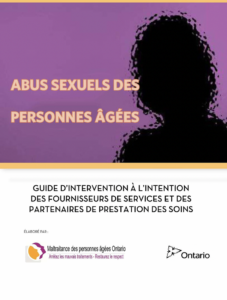 Une série de guides de formation offerte en format standard expose les différentes formes que peuvent prendre l’abus des aînés et les faits à ce sujet. Chaque guide comprend des sections sur les thèmes suivants : Définitions, facteurs de risque et signaux d’alarme, stratégies d’entrevue, planification de la sécurité, signalement et lois, études de cas et ressources provinciales pour le soutien des aînés. Chacune de ces sections peut être utilisée séparément pour aborder des domaines spécifiques à étudier ou intégralement pour convenir à divers milieux de form ation ou défis liés aux contraintes de temps. Des secteurs interdisciplinaires peuvent utiliser le guide et le mettre à profit en provoquant des discussions qui susciteront des débouchés.
Une série de guides de formation offerte en format standard expose les différentes formes que peuvent prendre l’abus des aînés et les faits à ce sujet. Chaque guide comprend des sections sur les thèmes suivants : Définitions, facteurs de risque et signaux d’alarme, stratégies d’entrevue, planification de la sécurité, signalement et lois, études de cas et ressources provinciales pour le soutien des aînés. Chacune de ces sections peut être utilisée séparément pour aborder des domaines spécifiques à étudier ou intégralement pour convenir à divers milieux de form ation ou défis liés aux contraintes de temps. Des secteurs interdisciplinaires peuvent utiliser le guide et le mettre à profit en provoquant des discussions qui susciteront des débouchés.
Le Guide présente des études de cas sur la maltraitance des personnes âgées au sein des communautés bispirituelles, lesbiennes, gaies, bisexuelles, transgenres, queer et autres, en reflétant des histoires vraies, qui visent à évoquer des perceptions personnelles face aux situations qui se présentent, à encourager la pensée critique liée à une réaction ou à une intervention, et à promouvoir les meilleures pratiques, en fonction du rôle et du poste de la personne.
Télécharger : Francais
Une série de guides de formation offerte en format standard expose les différentes formes que peuvent prendre l’abus des aînés et les faits à ce sujet. Chaque guide comprend des sections sur les thèmes suivants : Définitions, facteurs de risque et signaux d’alarme, stratégies d’entrevue, planification de la sécurité, signalement et lois, études de cas et ressources provinciales pour le soutien des aînés. Chacune de ces sections peut être utilisée séparément pour aborder des domaines spécifiques à étudier ou intégralement pour convenir à divers milieux de formation ou défis liés aux contraintes de temps. Des secteurs interdisciplinaires peuvent utiliser le guide et le mettre à profit en provoquant des discussions qui susciteront des débouchés.
Le Guide présente des études de cas sur l’abus émotif, en reflétant des histoires vraies, qui visent à évoquer des perceptions personnelles face aux situations qui se présentent, à encourager la pensée critique liée à une réaction ou à une intervention, et à promouvoir les meilleures pratiques, en fonction du rôle et du poste de la personne.
Télécharger : Francais
Policy
La Prevention of Elder Abuse Policy and Program Lens est un cadre de travail analytique qui permet d’évaluer les politiques, les programmes et les pratiques (en place et proposés) qui visent à prévenir, à détecter et à répondre à l’abus des aînés.
L’outil a été mis au point grâce à un partenariat entre le Ministère des Services aux aînés et de l’Accessibilité (Secrétariat aux affaires des personnes âgées de l’Ontario) et la Coalition ontarienne de la santé.
Télécharger : Français
Boîte à outils Tea & Talk
La boîte à outils Tea & Talk a pour but d’inspirer les groupes de personnes âgées, les communautés et les organismes de soutien, à tenir des ateliers informatifs qui incitent les aînés à s’entretenir entre eux au sujet de l’initiation de relations saines et de leur maintien. La première étape du processus visant à améliorer la vie des personnes âgées, à grossir leur réseau de soutien et à contribuer à prévenir l’abus des aînés et faire en sorte de prévenir tant la violence domestique que la violence sexuelle à leur endroit en amorçant des conversations au sujet des relations saines.
La boîte à outils comprend huit (8) modules, fournit des informations, des ressources et des outils destinés à un auditoire formé d’aînés. Ces thèmes comprennent les communications dans les relations saines, l’amélioration de l’estime de soi, les fréquentations, la discrimination fondée sur l’âge, la prestation de soins, la protection des finances, un examen plus approfondi de la maltraitance des aînés et les préjudices d’ordre sexuel. Ce guide aide les facilitateurs à orienter les discussions qu’ont les aînés avec eux dans ces domaines.
La boîte à outils est le fruit de la collaboration entre le Kawartha Sexual Assault Centre et Prévention de la malraitance envers les âinés Ontario (PMEAO). Elle a été créée en suivant les conseils des fournisseurs de services sociaux des régions de Kawartha Lakes et de Peterborough. PMEAO a adapté la boîte d’outil pour qu’elle puisse être utilisée dans toute la province.
Télécharger : Français
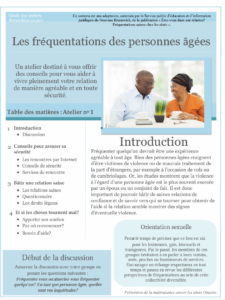
Le présent module de la boîte à outils fournit des conseils aux aînés afin d’assurer leur sécurité, qu’ils jouissent de la vie et profitent le plus possible de la compagnie de leurs pairs. Des outils intégrés permettent de créer des relations saines et sécuritaires tout en fournissant une liste de programmes et de services auxquels faire appel pour obtenir du soutien dans le cas où un partenariat deviendrait une relation abusive.
Télécharger : Français
Ce module de la boîte à outils fournit aux participants la possibilité de mieux comprendre en quoi consistent la maltraitance des aînés, la manière de reconnaître les facteurs de risque et signes de maltraitance, la manière de signaler la maltraitance et la meilleure manière de soutenir un aîné qui est maltraité ou à risque de le devenir.
Télécharger : Français
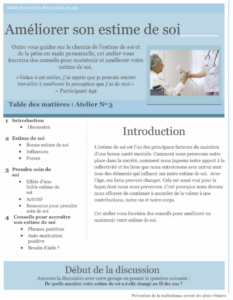 L’estime de soi est l’un des plus importants facteurs pour conserver une bonne santé mentale. Nous devons nous efforcer de toujours reconnaître la valeur de nos contributions, de nos vies et de nos corps. Ce module fournit aux aînés des informations et des conseils pour améliorer ou maintenir l’estime de soi et l’habilitation.
L’estime de soi est l’un des plus importants facteurs pour conserver une bonne santé mentale. Nous devons nous efforcer de toujours reconnaître la valeur de nos contributions, de nos vies et de nos corps. Ce module fournit aux aînés des informations et des conseils pour améliorer ou maintenir l’estime de soi et l’habilitation.
Télécharger : Français
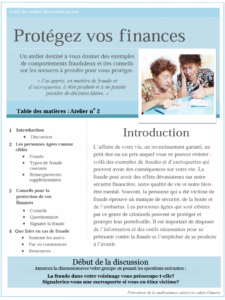
Les aînés sont fréquemment victimes de fraude et ses effets destructeurs peuvent se répercuter sur leur sécurité financière, leur qualité de vie et leur bien-être mental. Ce module éclaire les aînés concernant les fraudes, les escroqueries, les comportements frauduleux et la manière de les prévenir à l’avenir.
Télécharger : Français
Le présent module permet de survoler l’âgisme, y compris sa définition et fournit des exemples. En posant des questions de débat et en soumettant un jeu-questionnaire, nous explorons le lien entre l’âgisme et l’abus ainsi que les droits des aînés. Voici des astuces visant à dénoncer l’âgisme et les ressources pour des soutiens.
Télécharger : Français
Les communications constituent le premier élément pour toute relation saine. Les rôles que nous jouons, les responsabilités qui nous incombent et notre santé peuvent varier au fur et à mesure que nous vieillissons. Il peut devenir difficile d’en parler avec nos familles. Le présent module fournit d’excellentes façons de communiquer et des bases solides qui contribuent à améliorer les communications dans les relations. Ainsi, les désirs de l’aîné sont clairement établis et ses besoins sont comblés. La boîte à outils comprend des trucs pour aider à assurer la sécurité et l’assertivité des aînés et leur procure des ressources lorsque leur voix ne suffit pas.
Telécharger: Française
Il est difficile de prendre soin des autres et de soi-même en même temps. Le présent module aide les aidants à comprendre en quoi consistent la prestation de soins, les symptômes du stress qui lui sont liés, les types de soutien et les ressources mises à leur portée, et la manière d’établir des stratégies d’autonomie pour prendre soin de soi tout en continuant à prendre soin des autres.
Télécharger: Français
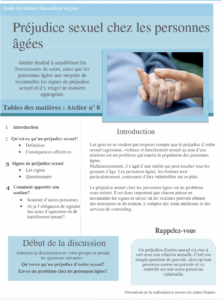
Les aînés, surtout les femmes, continuent d’être vulnérables face aux préjudices sexuels. Le présent module est axé sur la formation des aidants, ainsi que sur celle des aînés concernant la manière de reconnaître les préjudices sexuels, et la manière de traiter le problème. La boîte à outils définit en quoi consiste la maltraitance sexuelle, décrit les effets émotifs sur les femmes âgées, établit le devoir de signaler une agression sexuelle et le harcèlement, et envisage les perspectives d’entraide.
Télécharger: Français
Abus Sexuel
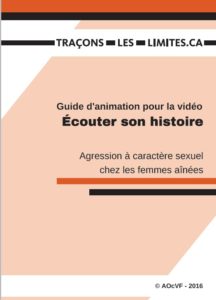 Cette vidéo et ce guide d’animation font partie de la campagne provinciale Traçons-les-limites, qui vise à sensibiliser les personnes de l’entourage à la violence à caractère sexuel.
Cette vidéo et ce guide d’animation font partie de la campagne provinciale Traçons-les-limites, qui vise à sensibiliser les personnes de l’entourage à la violence à caractère sexuel.
Présentation de la campagne Traçons-les-limites
La violence à caractère sexuel existe bel et bien en Ontario. Elle est présente dans toutes les villes et toutes les communautés de la province et elle a des effets sur notre vie, sur celle de notre entourage, comme nos amies et amis, notre famille ou nos collègues, et sur l’ensemble de la société. Elle doit donc être éliminée.
Pour mettre fin à la violence à caractère sexuel en Ontario, nous devons non seulement prendre des mesures pour soutenir les survivantes et tenir les agresseurs responsables de leurs actes, mais également faire de la prévention et de l’éducation publique. Ce type de violence est en effet souvent mal compris et soumis à de nombreux mythes. Le public en général n’a donc pas toujours une réelle compréhension de ce que sont les agressions à caractère sexuel et de leurs impacts, ce qui amène notre société à tolérer ces formes de violence.
Présentation des vidéos
Les vidéos et guides Traçons-les-limites ont été créés pour répondre à un besoin des intervenantes travaillant dans les services et centres d’aide et de lutte contre les agressions à caractère sexuel (CALACS).
Projet développé par Action ontarienne contre la violence faite aux femmes (AOcVF) avec la collaboration de différents partenaires: de Maltraitance des personnes âgées Ontario, du Centre de santé communautaire Hamilton/Niagara, du Centre Novas, CALACS francophone de Prescott-Russell, du Centre Passerelle pour femmes du Nord de l’Ontario
Download in: French
Cette boîte à outils est conçue expressément pour les organismes qui soutiennent les victimes âgées vulnérables, à risque ou qui sont victimes de maltraitance sexuelle. La boîte à outils fournit des informations importantes qui s’adressent tant aux femmes âgées qu’aux hommes âgés sur la violence familiale et celle entre partenaires. Elle contient également des suggestions et des stratégies pour aider à protéger les aînés en situation de risque à rester en sécurité.
La boîte à outils utilise une approche pour répondre aux questions fréquentes que plusieurs aînés se posent sur le fondement de leurs relations avec les autres. Que puis-je faire? Qui peut m’aider?
La boîte à outils est le fruit d’un partenariat de travail entre PMAEO et METRAC Action on Violence dont le financement est octroyé par la Fondation du droit de l’Ontario.
Télécharger: Français
Ce guide se veut une ressource exhaustive qui prend en compte l’âge, le genre et les contextes culturels afin d’améliorer les connaissances communes du public et de faciliter davantage la coordination et la mise en œuvre des programmes et des services.
Le guide reconnaît la diversité des communautés de femmes âgées dans l’ensemble de l’Ontario. Les membres des comités responsables de la coordination à l’échelle locale surtout centrés sur l’abus des aînés ou sur la violence exercée contre les femmes peuvent l’utiliser pour mieux faire connaître une approche régionale mieux intégrée qui répond aux besoins des communautés individuelles.
Le Guide a été mis au point en collaboration avec le Sheridan Elder Research Centre (SERC) et le Secrétariat aux affaires des personnes âgées de l’Ontario en 2007.
Télécharger Français
VIDÉOS
L’âgisme nous affecte tout au long de notre vie, mais il s’aggrave avec l’âge. Le message que nous absorbons chaque jour est clair : plus on vieillit, moins on compte. L’âgisme nous affaiblit et a un lien direct avec la maltraitance des personnes âgées. Il est temps de se libérer de l’âgisme.
La production de la vidéo a été réalisée en collaboration avec le Réseau canadien pour la prévention de la maltraitance des personnes âgées (RCNPA) et le Centre de recherche et d’éducation sur la violence faite aux femmes et aux enfants (CREVWAC) et financée par le ministère de la Justice du Canada dans le cadre du Événements de l’EAPO pour la Semaine des victimes et survivants d’actes criminels (May 2023).
vidéo réalisée par: Kindea Labs
May, 2023
Durée : 2,28 minutes
Les « années d’or » promises ne sont peut-être pas aussi dorées pour de nombreuses personnes âgées. Il est douloureux de découvrir que plus vous vieillissez, les autres peuvent ne pas vous voir comme une personne à part entière.
PMAO a créé une vidéo pour informer les personnes âgées, les familles, les individus, les organisations et les communautés sur l’âgisme, la maltraitance des personnes âgées et son impact sur ces dernières. Quel que soit leur sexe, de nombreuses personnes âgées se sentent invisibles car l’âgisme est très répandu. Les mots et les comportements âgistes sont nuisibles et conduisent à la discrimination et à la maltraitance.
La vidéo souligne que dans chaque communauté, des organisations travaillent ensemble pour vous soutenir. Si vous avez besoin de soutien ou si vous souhaitez parler à quelqu’un, contactez PMAO pour obtenir une liste des services disponibles dans votre communauté.
La production de la vidéo a été réalisée en collaboration avec le Réseau canadien pour la prévention de la maltraitance des personnes âgées (RCNPA) et le Centre de recherche et d’éducation sur la violence faite aux femmes et aux enfants (CREVWAC) et financée par le ministère de la Justice du Canada dans le cadre du Événements de l’EAPO pour la Semaine des victimes et survivants d’actes criminels (2021).
vidéo réalisée par: Kindea Labs
May, 2021
Durée : 1,43
PMEAO a créé une vidéo pour encourager les particuliers, les organismes, les communautés et les gouvernements à travailler ensemble pour protéger et préserver nos droits humains. Bâtir une société dans laquelle les personnes de tous âges sont respectées et ont l’opportunité de contribuer au bien-être de la communauté, c’est un objectif qui mérite notre énergie.
Les particuliers, les organismes, les communautés et les gouvernements se doivent de travailler ensemble pour protéger et préserver nos droits humains. Le changement est possible. Ensemble, nous pouvons créer une société qui valorise et respecte ses citoyens à tous les âges, aujourd’hui et pour les générations à venir. C’est à vous de choisir. Dans quel type de communauté aimeriez-vous vieillir? Commençons dès aujourd’hui.
vidéo réalisée par: Kindea Labs
May, 2021
Durée: 1,46
Cette courte vidéo d’animation traite des attitudes et comportements âgistes envers les personnes âgées et de leur impact sur les personnes âgées. La vidéo encourage les gens à réfléchir à leur propre avenir et à la manière dont ils voudraient être traités avec dignité et respect pour leurs expériences de vie. Il permet aux personnes de tous âges de défendre les droits des personnes âgées et de repousser les messages anti-âge.
La production de la vidéo a été réalisée en collaboration avec le Réseau canadien pour la prévention de la maltraitance des personnes âgées (RCNPA) et le Centre de recherche et d’éducation sur la violence faite aux femmes et aux enfants (CREVWAC) et financée par le ministère de la Justice du Canada dans le cadre du Événements de l’EAPO pour la Semaine des victimes et survivants d’actes criminels (2021).
vidéo réalisée par: Kindea Labs
May, 2021
Durée : 1,27 minutes
Le RCNPA élabore une stratégie pancanadienne pour accroître la prévention de la maltraitance des personnes âgées. L’PMAEO a collaboré avec le RCNPA pour développer une feuille de route avec de multiples points d’entrée, qui permet à chacun de nous, au niveau individuel, organisationnel, communautaire et gouvernemental, de jouer un rôle dans la prévention de la maltraitance des personnes âgées, maintenant et pour les générations à venir. Le changement est possible. Nous avons tous un rôle à jouer. Es-tu prêt?
La production de la vidéo a été réalisée en collaboration avec le Réseau canadien pour la prévention de la maltraitance des personnes âgées (RCNPA) et le Centre de recherche et d’éducation sur la violence faite aux femmes et aux enfants (CREVWAC) et financée par le ministère de la Justice du Canada dans le cadre du Événements de l’EAPO pour la Semaine des victimes et survivants d’actes criminels (2021).
vidéo réalisée par: Kindea Labs
Durée : 1,37
La production de la vidéo a été réalisée en collaboration avec le Réseau canadien pour la prévention de la maltraitance des personnes âgées (RCNPA) et le Centre de recherche et d’éducation sur la violence faite aux femmes et aux enfants (CREVWAC).
vidéo réalisée par: Kindea Labs
octobre 2022
Durée : 1,30
La production de la vidéo a été réalisée en collaboration avec le Réseau canadien pour la prévention de la maltraitance des personnes âgées (RCNPA) et le Centre de recherche et d’éducation sur la violence faite aux femmes et aux enfants (CREVWAC).
vidéo réalisée par: Kindea Labs
octobre 2022
Durée : 1,23
La production de la vidéo a été réalisée en collaboration avec le Réseau canadien pour la prévention de la maltraitance des personnes âgées (RCNPA) et le Centre de recherche et d’éducation sur la violence faite aux femmes et aux enfants (CREVWAC).
vidéo réalisée par: Kindea Labs
octobre 2022
Durée : 1,28
La production de la vidéo a été réalisée en collaboration avec le Réseau canadien pour la prévention de la maltraitance des personnes âgées (RCNPA) et le Centre de recherche et d’éducation sur la violence faite aux femmes et aux enfants (CREVWAC) et financée par le ministère de la Justice du Canada dans le cadre du Événements de l’EAPO pour la Semaine des victimes et survivants d’actes criminels (2021).
vidéo réalisée par: Kindea Labs
Juin 2023
Durée : 1,
PMEAO a produit trois « Public Service Announcement (PSA) » afin de mieux sensibiliser le public à la violence à l’égard des aînés et informer le public quant à l’aide disponible en Ontario. Ces PSA ont été diffusés à la télévision ainsi que sur le Web et les médias sociaux. (2019)
Ce PSA diffusé en français est sur l’exploitation financière des personnes âgées
Vidéo: 0:35
Prévention des mauvais traitements envers les aînés Ontario a produit trois messages d’intérêt public (ASP), à la fois en anglais et en français, pour accroître la sensibilisation aux mauvais traitements envers les aînés et informer le public sur les endroits où demander de l’aide en Ontario. Ces messages d’intérêt public ont été diffusés à la télévision et partagés sur le Web et les médias sociaux. (2019)
Ce message d’intérêt public produit , se concentre sur l’abus financier des personnes âgées.
Vidéo: 0:35
PMEAO a produit trois « Public Service Announcement (PSA) » afin de mieux sensibiliser le public à la violence à l’égard des aînés et informer le public quant à l’aide disponible en Ontario. Ces PSA ont été diffusés à la télévision ainsi que sur le Web et les médias sociaux. (2019)
Ce message d’intérêt public diffusé en français porte principalement sur la violence psychologique chez les aînés
Vidéo: 0:35
PMEAO a produit trois « Public Service Announcement (PSA) » afin de mieux sensibiliser le public à la violence à l’égard des aînés et informer le public quant à l’aide disponible en Ontario. Ces PSA ont été diffusés à la télévision ainsi que sur le Web et les médias sociaux. (2019)
Ce PSA diffusé en français est surtout axé sur la violence physique chez les aînés.
Vidéo: 0:35
Agression à caractère sexuel chez les femmes âgées. Avec Guide d’animation pour la vidéo Écouter son histoire: Agression à caractère sexuel chez les femmes aînées


